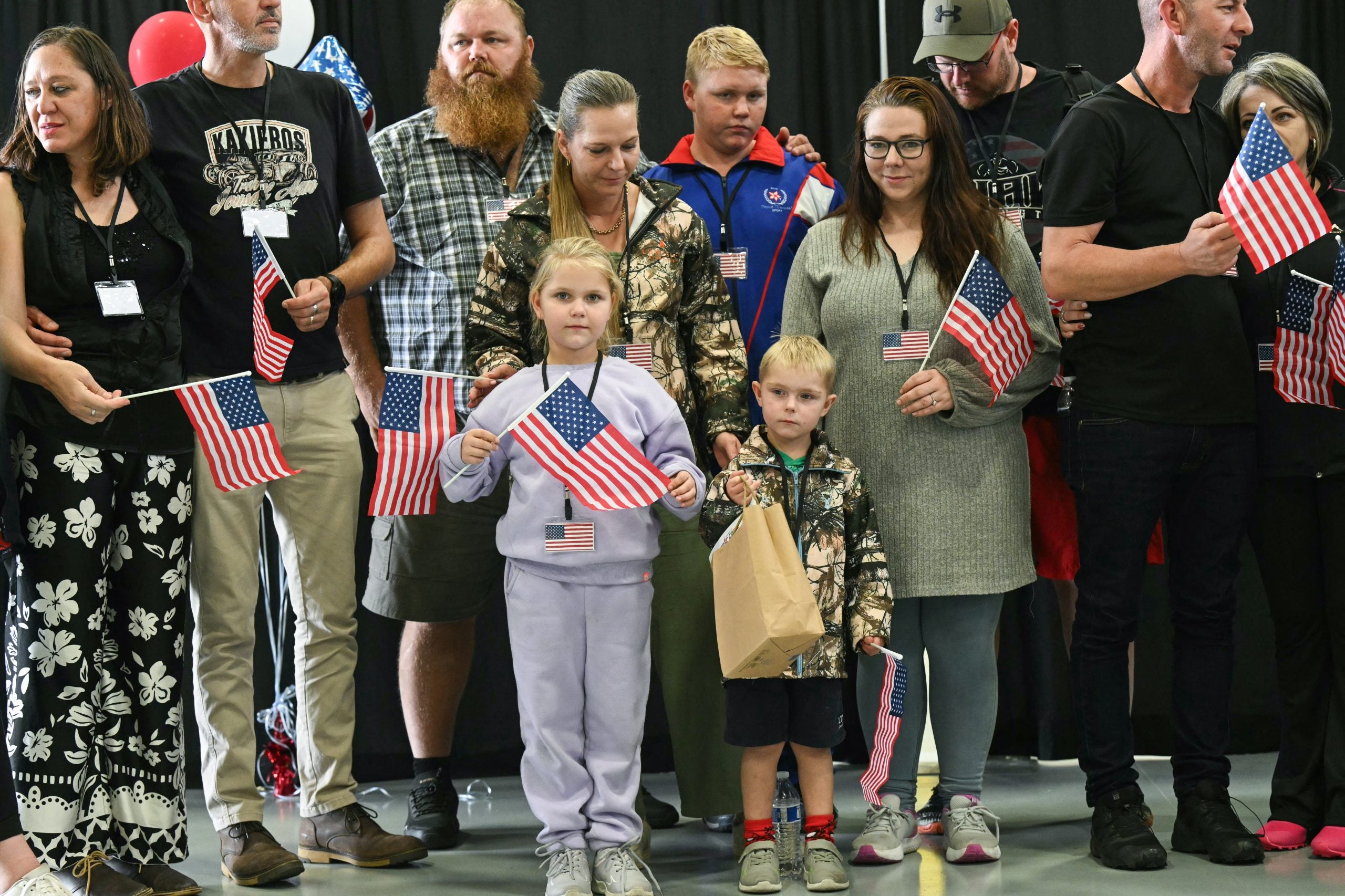
A group of 59 white South Africans arrived at Washington Dulles International Airport on Monday afternoon, greeted by U.S. officials as newly admitted refugees.
The group—members of the Afrikaner minority, who once ruled South Africa during apartheid—was brought to the U.S. on a State Department-chartered flight and received by Deputy Secretary of State Christopher Landau and Deputy Homeland Security Secretary Troy Edgar, according to NBC News.
Their arrival raised eyebrows for one major reason: while the Trump administration continues to block refugees from countries like Afghanistan, Sudan, the Republic of Congo and Myanmar, this group was admitted under a special carve-out. A February executive order from President Trump cited “race-based discrimination” and “racially discriminatory property confiscation” as the reason for allowing them entry.

“These refugees tell quite harrowing stories of the violence that they faced in South Africa that was not redressed by the authorities,” Landau told reporters. “The United States, as we were proud to say, has stood for equal justice under law.”
The executive order claimed that the South African government had seized land from white farmers without compensation and accused the country of showing a “shocking disregard of its citizens’ rights.” Trump even ordered a freeze on U.S. aid to South Africa — a move backed by Elon Musk, who now leads the administration’s Department of Government Efficiency (DOGE).
South African President Cyril Ramaphosa disputed the U.S. government’s characterization of the country’s new land law, writing on X in February that the Expropriation Act was “not a confiscation instrument, but a constitutionally mandated legal process that ensures public access to land in an equitable and just manner.”
Still, Trump and some of his officials — including Musk, called what was happening to Afrikaners a “genocide.” That’s not just misleading, say experts — it’s dangerous.
The data doesn’t back it up, either. While farm attacks are real and tragic, they’re not racially one-sided. Between 2020 and 2024, about 101 of the 225 people killed on farms in South Africa were Black farmworkers, according to The New York Times. White farmers were among the victims too — but so were many of the workers who keep those farms running.
However, U.S. officials said the exception made for Afrikaner refugees was consistent with U.S. interests. “From the very beginning, the president’s pause of the U.S. refugee program was subject to exceptions when it was determined to be in the interest of the United States,” Landau said, adding that the group “could be assimilated easily into our country.”
The administration has pushed back on suggestions that the decision was race-related. “Farmers are being killed,” Trump told reporters on Monday. “They happen to be white. Whether they are white or Black makes no difference to me.”
White House Deputy Chief of Staff and Homeland Security Adviser Stephen Miller also defended the carve-out, saying, “This is race-based persecution. The refugee program is not intended as a solution for global poverty, and historically, it has been used that way.”
Faith leaders, human rights groups and South African officials are pushing back. Chrispin Phiri, a spokesperson for South Africa’s Ministry of International Relations, didn’t mince words: “It’s politically motivated,” he said. “It’s designed to question our constitutional democracy — a democracy that rose out of actual persecution under apartheid.”
Even the Episcopal Church, which helps resettle refugees, refused to be involved. They were asked by the federal government to assist the Afrikaner families — and said no.
Presiding Bishop Sean Rowe explained the church’s decision in an open letter: “It has been painful to watch one group of refugees, selected in a highly unusual manner, receive preferential treatment over many others who have been waiting in refugee camps or dangerous conditions for years.”
Rowe added that many of the people now being turned away — especially from places like Afghanistan and Iraq — had risked their lives to support the U.S. military. “I am saddened and ashamed,” he wrote.
Back in South Africa, some fear this move could stir up even more racial tension.
“Calling this a ‘genocide’ is not just incorrect — it’s inflammatory,” Thula Simpson, a historian at the University of Pretoria told NBC News. “It raises the stakes in a country still healing from the deep wounds of apartheid. The outcome is unpredictable.”
Still, U.S. officials say they stand by the decision. “The South African government has not done what we feel is appropriate to guarantee the rights of these citizens to live in peace with their fellow South Africans, which is why, under our domestic law, they were given refugee status,” Landau said.
